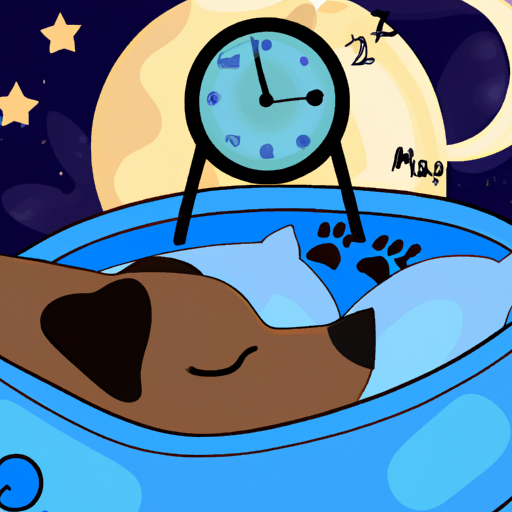Sleep is crucial for every living creature, including our beloved canine companions. Understanding your pet’s sleep patterns can help you ensure they are healthy and happy. This guide will explain how much sleep dogs need, and what factors can influence their sleep patterns.
Understanding a Dog’s Sleep Cycle
Just like you, your dog goes through different stages of sleep, from light sleep to deep REM sleep. Dogs spend about 44% of their time alert and active, 23% in light sleep, and 33% in REM sleep. Unlike humans, who typically enter REM sleep about 90 minutes after falling asleep, dogs might enter this deep sleep stage just 10 minutes into their nap.
- Light Sleep: This is the stage where your dog is easily awakened. They may twitch, whimper, or even ‘run’ in their sleep during this stage.
- REM Sleep: During this stage, your dog is deeply asleep and dreaming. It’s crucial for their brain health.
Factors That Affect a Dog’s Sleep
Several factors can affect how much sleep a dog needs. These include:
- Age: Puppies and older dogs tend to sleep more than young and adult dogs.
- Breed: Large breeds often sleep more than smaller breeds.
- Activity Level: Active dogs need more sleep to recover from physical exertion.
- Health: Dogs with health issues might sleep more or less than usual.
How Much Sleep Do Dogs Need?
Here’s a rough guide on how much sleep dogs generally need depending on their age:
| Dog’s Age | Average Sleep Duration |
|---|---|
| Puppy | 18-20 hours |
| Adult | 12-14 hours |
| Senior | Up to 18 hours |
Sleep Disorders in Dogs
Just like humans, dogs can suffer from sleep disorders. These can affect their quality of life and should be addressed by a vet. Some common sleep disorders in dogs include:
- Sleep Apnea: Mostly seen in overweight and brachycephalic breeds.
- Insomnia: Often a sign of underlying health issues.
- Narcolepsy: A neurological disorder that causes excessive daytime sleepiness.
FAQs
Q: Why does my dog sleep so much?
A: Dogs sleep more than humans, so it might seem like they’re always sleeping. If your dog is sleeping more than the average for their age or breed, or if their sleep patterns suddenly change, it could be a sign of a health problem. Consult your vet if you’re concerned.
Q: Is it normal for my dog to twitch or ‘run’ in their sleep?
A: Yes, it’s normal and often a sign that your dog is dreaming. If the twitching becomes violent or your dog seems distressed, it could be a sign of a sleep disorder.
Q: Should I wake my dog if they’re having a nightmare?
A: It’s best to let sleeping dogs lie. Waking them could startle them and lead to accidental bites.
Q: Can I do anything to help my dog sleep better?
A: Yes, regular exercise, a comfortable sleeping area, and a consistent routine can all help improve your dog’s sleep.
By understanding how much sleep your dog needs, you can ensure they’re getting the rest they need for a happy, healthy life. So, keep an eye on those snoozing habits, and sweet dreams to your furry friend!



